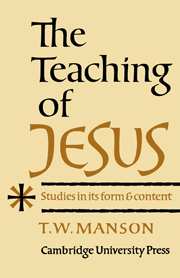Book contents
- Frontmatter
- Contents
- Preface
- LIST OF ABBREVIATIONS
- PART I PRELIMINARY QUESTIONS
- PART II THE CONTENTS OF THE TEACHING
- Chap. IV God as Father
- Chap. V God as King
- Chap. VI God as King: The Eternal Sovereignty
- Chap. VII God as King: The Kingdom in the World
- Detached Note C. The Terms ‘Disciple’ and ‘Apostle’
- Chap. VIII God as King: The Final Consummation
- Chap. IX Religion and Morals
- Detached Note D. On Mk x. 42–44
- Detached Note E. On Mk vii. 6–13
- Appendices I–VI
- Additional Notes
- General Index
- Reference Index
Chap. VIII - God as King: The Final Consummation
Published online by Cambridge University Press: 31 March 2010
- Frontmatter
- Contents
- Preface
- LIST OF ABBREVIATIONS
- PART I PRELIMINARY QUESTIONS
- PART II THE CONTENTS OF THE TEACHING
- Chap. IV God as Father
- Chap. V God as King
- Chap. VI God as King: The Eternal Sovereignty
- Chap. VII God as King: The Kingdom in the World
- Detached Note C. The Terms ‘Disciple’ and ‘Apostle’
- Chap. VIII God as King: The Final Consummation
- Chap. IX Religion and Morals
- Detached Note D. On Mk x. 42–44
- Detached Note E. On Mk vii. 6–13
- Appendices I–VI
- Additional Notes
- General Index
- Reference Index
Summary
ESCHATOLOGY IN GENERAL
WHENEVER a living faith in a righteous, holy and loving God is brought up hard against the facts of human experience, some sort of eschatology must emerge if men are not to deny either their faith or their experience. It may be said, moreover, that the character of a religion is determined by its eschatology,. by the way in which it overcomes the opposition between what is and what ought to be. There is thus great justice in Biedermann's advice that one should begin the reading of any book on dogmatics at the end, because in its eschatology the innermost character of the system comes out most clearly. In principle there are three possible resolutions of the contradiction between what is and what ought to be.
It may be said that what is determines what shall be, and that ‘ought to be’ is a mere dream incapable of fulfilment.
That Man is the product of causes which had no prevision of the end they were achieving; that his origin, his growth, his hopes and fears, his loves and beliefs, are but the outcome of accidental collocations of atoms; that no fire, no heroism, no intensity of thought and feeling, can preserve an individual life beyond the grave; that all the labours of the ages, all the devotion, all the inspiration, all the noonday brightness of human genius, are destined to extinction in the vast death of the solar system, and that the whole temple of Man's achievement must inevitably be buried beneath the debris of a universe in ruins–all these things, if not quite beyond dispute, are yet so nearly certain, that no philosophy which rejects them can hope to stand. […]
- Type
- Chapter
- Information
- Teaching of Jesus , pp. 244 - 284Publisher: Cambridge University PressPrint publication year: 1935

